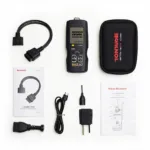The dreaded check engine light illuminating your dashboard can send shivers down any car owner’s spine. When your OBD2 scanner reveals the cryptic code P0058, a sense of confusion and worry might set in. What does it mean? Is it a minor hiccup or a major engine malfunction? This comprehensive guide will demystify OBD2 code P0058, explaining its causes, symptoms, diagnostic procedures, and potential solutions.
What Does OBD2 Code P0058 Mean?
The code P0058 specifically points to a problem with the “HO2S Heater Control Circuit (Bank 2, Sensor 2).” Let’s break down this technical jargon:
- HO2S: Stands for Heated Oxygen Sensor, a crucial component in your vehicle’s emission control system. It measures the oxygen content in the exhaust gases.
- Heater Control Circuit: The oxygen sensor needs to be heated to operate efficiently. The heater control circuit regulates this heating process.
- Bank 2: Refers to the side of the engine opposite the cylinder #1.
- Sensor 2: Indicates the downstream oxygen sensor, positioned after the catalytic converter.
In essence, P0058 signifies an issue with the electrical circuit responsible for heating the downstream oxygen sensor on the engine bank without cylinder #1.
Causes of OBD2 Code P0058
Several culprits could trigger the P0058 code, ranging from simple wiring issues to faulty sensors:
- Faulty Oxygen Sensor: The downstream oxygen sensor itself might be damaged or malfunctioning, causing the heater circuit to fail.
- Wiring Problems: Damaged, corroded, or loose wiring in the heater control circuit can disrupt the electrical flow.
- Blown Fuse: A blown fuse in the oxygen sensor heater circuit can cut off power to the heater.
- Faulty Oxygen Sensor Relay: The relay responsible for switching the heater on and off could be defective.
- Engine Control Module (ECM) Issues: While less common, a problem with the ECM, the brain of your car’s engine management system, can also lead to this code.
Symptoms of OBD2 Code P0058
While the check engine light is the most apparent sign, other symptoms might accompany the P0058 code:
- Decreased Fuel Economy: A malfunctioning oxygen sensor can disrupt the air-fuel mixture, leading to reduced fuel efficiency.
- Rough Engine Idle: The engine might idle roughly or inconsistently due to incorrect air-fuel ratio readings.
- Failed Emissions Test: The P0058 code can directly impact your vehicle’s ability to pass emissions tests.
- Poor Engine Performance: You might experience sluggish acceleration or overall reduced engine performance.
Diagnosing OBD2 Code P0058
Accurately diagnosing the root cause of P0058 requires a systematic approach:
- Read the Code: Use your OBD2 scanner to read the diagnostic trouble code stored in your car’s ECM.
- Inspect the Wiring: Visually examine the wiring harness connected to the downstream oxygen sensor for any signs of damage, corrosion, or loose connections.
- Check the Fuse: Locate the fuse associated with the oxygen sensor heater circuit and inspect it for any signs of being blown.
- Test the Oxygen Sensor Heater Circuit: Using a multimeter, test the voltage and resistance of the heater circuit to ensure proper electrical flow.
- Inspect the Oxygen Sensor: Examine the oxygen sensor for any physical damage or contamination. You can also test its functionality using specialized tools.
Fixing OBD2 Code P0058
The solution for the P0058 code directly corresponds to the diagnosed problem:
- Replace the Oxygen Sensor: If the oxygen sensor is faulty, replacing it is the most effective solution.
- Repair or Replace Wiring: Repair any damaged or corroded wires, and secure any loose connections.
- Replace the Fuse: If the fuse is blown, replace it with a new one of the correct amperage rating.
- Replace the Oxygen Sensor Relay: A faulty relay needs to be replaced to restore proper heater function.
- Consult a Mechanic: If the ECM is suspected to be faulty, consult a qualified mechanic for diagnosis and repair.
Expert Insights from Michael Thompson, ASE Certified Master Technician
“The P0058 code often stems from a faulty oxygen sensor, but it’s crucial not to jump to conclusions. Thoroughly inspect the wiring and related components before replacing the sensor. Remember, a systematic diagnosis can save you time and money.”
Preventing OBD2 Code P0058
While not all causes are preventable, proactive maintenance can significantly reduce the risk of encountering this code:
- Regularly Inspect Wiring: Periodically check the oxygen sensor wiring for any signs of wear and tear.
- Address Engine Issues Promptly: Ignoring other engine problems can put stress on the oxygen sensor and its circuitry.
- Use Quality Fuel and Oil: Using high-quality fuel and oil can help maintain the health of your engine and its sensors.
OBD2 Code P0058: FAQs
Q1: Can I still drive my car with code P0058?
A: While you might be able to drive for a short period, it’s not advisable. Driving with a faulty oxygen sensor can lead to further damage and decreased fuel efficiency.
Q2: How much does it cost to fix code P0058?
A: The cost can vary significantly depending on the root cause and labor costs. A simple wiring repair might cost under $100, while replacing the oxygen sensor could range from $200 to $400.
Q3: Can I fix P0058 myself?
A: If you have basic mechanical skills and tools, you might be able to handle simple repairs like replacing a fuse or tightening loose connections. However, it’s always best to consult a qualified mechanic for complex issues.
Related OBD2 Codes and Resources
For further information on related OBD2 codes and helpful resources, explore these articles on OBDFree:
- P0130: O2 Sensor Circuit Malfunction (Bank 1, Sensor 1)
- P0135: O2 Sensor Heater Circuit Malfunction (Bank 1, Sensor 1)
- How to Use an OBD2 Scanner
- Common Car Sensor Problems and Solutions
Need Further Assistance?
Is the check engine light still staring you down? Don’t hesitate to reach out to our team of automotive experts. We’re available 24/7 via WhatsApp at +1(641)206-8880 or email at [email protected]. Let us help you get back on the road with confidence.

